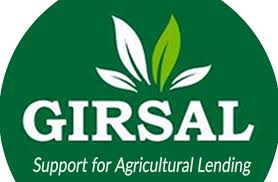The Ghana Incentive-Based Risk-Sharing System for Agricultural Lending (GIRSAL) has issued guarantee cover for loans of about GH¢66 million given by financial institutions to agribusinesses.
This was made known by Ken Ofori -Atta, the President’s nominee for Minister of Finance, in a speech read on his behalf by the former Minister of Planning, Prof. George Gyan-Baffour, at the 72nd Annual New Year School and Conference in Accra.
GIRSAL, which was established by the Bank of Ghana in 2016 and is now owned by the Ministry of Finance, has signed agreements with 14 financial institutions through which the guarantees were issued to secure loans for the agricultural sector. The non-bank financial Institution incorporated as a private company in Ghana has as its objective to de-risk agricultural financing by the financial institutions, by issuing agricultural credit guarantee instruments – to enhance the total amount of credit to the agricultural and agribusiness sectors.
The catalytic role of GIRSAL in mobilizing private sector financing for agriculture is projected to be critical to the success of government initiatives such as the One District One Factory (1D1F) programme. Given that a key precursor for the 1D1F is the production of agricultural raw materials, GIRSAL’s financing guarantees stand as vital to securing the volumes of agricultural commodities required to power the initiative which is meant to change the nature of Ghana’s economy from one which is dependent on import and export of raw material to one which is focused on manufacturing, value addition and export of processed goods. GIRSAL’s support is expected to enable the 1D1F initiative champion agro-processing through promoting the setting up of factories or revamping underperforming factories.
According to the 1D1F Secretariat, the initiative has yielded about 170 factories at different stages of completion. Out of this number, a total of 28 factories have been completed and are operating fully as direct 1D1F projects, while 31 factories are under construction. Additionally, the government has partnered with the private sector to either revive or expand 48 existing factories, bringing the total number of operational factories to 76.
The government’s flagship and priority programmes such as One-district, One-factory (1D1F), Planting for Food and Jobs, and the new trade facilitation programmes are designed to transform the Ghanaian economy and position the country as the new manufacturing hub of the region. Following the implementation of the Africa’s current free trade agreement, AfCFTA, the government has made commitment to ensuring that adequate financing and human resources are mobilized to make Ghana the new commercial centre for trade financing and investment on the continent. The government is also poised to build on the successes of the 1D1F through strategic policies to further enhance agro-processing so as to take advantages of the African Continental Free Trade Area.
The African Continental Free Trade Area provides Ghana with the opportunity to champion the government industrialization agenda which has the potential to create employment opportunities for the youth, generate foreign exchange whiles accelerating the development of Ghana’s agricultural sector and becoming self-sufficient in food production.
Read also : Private Sector must widen the scope of PFJ for sustainable agri-food system – Prof. Irene Egyir




















